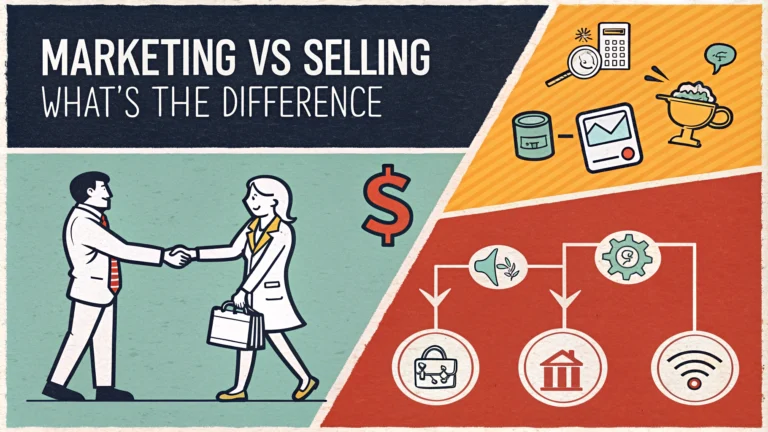The terms marketing and selling often get mixed up in business conversations. While both aim to boost revenue, they serve distinct purposes and require different approaches. Understanding these differences helps businesses create more effective strategies.
Marketing focuses on building long-term relationships and brand awareness, while selling involves direct transactions and immediate revenue generation. This quick guide breaks down these essential business functions to help you leverage both effectively.
Core Marketing and Sales Concepts
- Marketing: Customer-focused strategy to create awareness and demand
- Selling: Product-focused activity to close deals and generate revenue
| Marketing | Selling |
|---|---|
| Long-term focus | Short-term focus |
| Brand building | Transaction completion |
| Market research | Direct customer interaction |
Key Marketing Functions and Activities
- Market research and analysis
- Brand development
- Content creation and distribution
- Social media management
- Lead generation and nurturing
Sales Process and Techniques
- Prospect identification
- Sales presentation
- Objection handling
- Negotiation skills
- Deal closing strategies
“Marketing makes selling easier by creating awareness and demand before the sales team makes contact.”
Integrating Marketing and Sales Teams
Clear communication channels between marketing and sales teams boost efficiency and results. Regular meetings, shared metrics, and collaborative tools help create unity in pursuing business goals.
- Joint planning sessions
- Shared CRM platforms
- Feedback loops
- Performance tracking
Performance Metrics and KPIs
Different metrics track success in marketing and sales activities. Understanding these measurements helps optimize strategies and resource allocation.
| Marketing Metrics | Sales Metrics |
|---|---|
| Brand awareness | Conversion rates |
| Lead quality | Revenue generated |
| Website traffic | Deal size |
Digital Tools and Technologies
Modern marketing and sales rely on specialized tools to enhance effectiveness and track results.
- CRM systems for customer data management
- Analytics platforms for performance tracking
- Marketing automation tools
- Sales pipeline software
- Social media management platforms
“The right tools enhance team productivity and provide valuable insights for strategic decisions.”
Building a Unified Strategy
Success comes from aligning marketing and sales efforts toward common business objectives. Clear goals, open communication, and shared resources create a powerful revenue-generating engine.
- Set shared objectives
- Create clear handoff processes
- Develop integrated campaigns
- Measure combined impact
Remember that marketing and sales work best when operating as partners rather than separate entities. Regular evaluation and adjustment of strategies ensure continued effectiveness in meeting business goals.
Marketing vs Selling FAQs
Core Concept FAQs
Q: What is the main difference between marketing and selling?
A: Marketing focuses on identifying and meeting customer needs through research, product development, and brand building. Selling is the direct action of converting prospects into customers through transactions.
Q: Which comes first – marketing or selling?
A: Marketing typically comes first, creating awareness and demand for products or services. Selling follows as part of the marketing process.
Q: Can you have successful sales without marketing?
A: While possible, it’s challenging. Marketing creates the foundation for successful sales by:
- Building brand awareness
- Establishing market presence
- Generating qualified leads
- Creating customer trust
Long-tail Keyword FAQs
Q: What are the key metrics for measuring marketing vs sales success?
A:
| Marketing Metrics | Sales Metrics |
|---|---|
| – Lead generation rate – Brand awareness – Website traffic – Social media engagement |
– Conversion rate – Revenue generated – Deal closure rate – Customer acquisition cost |
Q: How does digital marketing differ from traditional selling methods?
A: Digital marketing uses online channels and data analytics to reach customers at scale, while traditional selling relies on direct, personal interactions and relationship building.
Q: What marketing strategies drive the highest sales conversion rates?
A: Top converting strategies include:
- Content marketing with clear CTAs
- Email marketing campaigns
- Social proof and testimonials
- Targeted PPC advertising
Q: What’s the average marketing to sales cycle timeline?
A: The cycle varies by industry but typically ranges from 1-6 months for B2C and 3-12 months for B2B products/services.
Q: How do marketing budgets compare to sales department budgets?
A: Marketing budgets typically range from 7-12% of revenue, while sales budgets often consume 15-20% of revenue in most industries.
Q: What skills overlap between marketing and sales professionals?
A: Common skills include:
- Communication abilities
- Customer psychology understanding
- Problem-solving capabilities
- Data analysis
- Market research interpretation
Q: How do B2B marketing and selling differ from B2C?
A: B2B typically involves longer cycles, higher transaction values, and relationship-based selling, while B2C focuses on emotional appeals and shorter decision processes.
Q: What ROI can businesses expect from marketing vs direct selling?
A: Marketing ROI averages 5:1, while direct selling ROI typically ranges from 3:1 to 4:1, depending on industry and implementation.



















